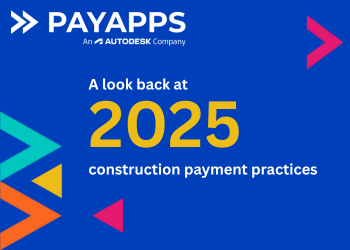Download the report here – ‘Connecting the Construction Workplace of the Future’.The Construction industry is a key player in any country’s economy and one of the most labour-intensive industries globally. The industry however is notorious for being much slower than other industries to embrace change and digitalisation. While it is certainly up to individual companies to determine their processes and operations, the sector is so tightly interwoven that future practices must be standardised and supported by the industry as a whole, encouraging collaboration across the board.

The Covid-19 pandemic has accelerated some much-needed changes to the industry, with those companies able to adapt quickly already finding themselves with an edge over their peers.
The industry finds itself facing many challenges ahead; a reliance on manual labour and outdated technology is having a significant impact on productivity. It is approximated that 63% of time allocated to a project is wasted due to poor planning and communication. With a number of political and societal issues such as Brexit and the pandemic affecting both supply chains and available labour in the UK, it is becoming increasingly obvious that the industry needs to change the way it is working.
Back in 2016, in the report ‘Modernise or Die’, Mark Farmer warned of impending issues with the Construction Labour Model in the UK. Worryingly, five years down the line, the situation seems to have got worse rather than better. The industry has no choice but to take action to address its future sustainability.
As the world as a whole modernises and embraces new technologies, there is an expectation on all sectors to be able to provide their services more efficiently and digitally. The Industry Digitization Index by McKinsey Global Institute shows Construction is among the least digitised sectors. Low spending on R&D and new technology has resulted in the industry being seen as uncoordinated and unsophisticated compared to its counterparts.
The age of expectation
As younger generations begin to work within family-owned businesses, more emphasis is being placed on new technologies and slowly these companies are starting to embrace a new way of working.
Currently, cloud computing software and services, such as building information modelling, is the most popular digital tool being used by construction companies, and has been of significant benefit throughout the pandemic given the increasingly dispersed workforces.
Providing younger workers with the tools to allow them to manage projects seamlessly while allowing easy collaboration across all parties, should now be a top priority for the management teams in construction firms.
Other individuals, however, may see a number of barriers to introducing new technological tools. Lack of understanding leads to worries about data security, and the initial set-up cost can sometimes appear prohibitive. However, the introduction of these digital tools will save money in the long run, with increased efficiency leading to a reduction in operational workload and therefore costs.
Modernising payment practices
One area which has been highlighted as a major challenge within the industry is the processing and management of construction payments. With many companies still managing their payment claims manually, tracking claims, supporting documentation, reconciling data, and correcting errors lead to excessive administrative time being spent on this area alone.
While many technological improvements tend to be concentrated on-site, those companies that have prioritised digitising their back-office processes are seeing positive returns on their investments. Not only are they benefiting from a reduction in operational costs and less stress for their employees, but they are also enjoying enhanced credibility within the industry as they make their payments on time, appear organised and efficient, and are able to attract preferred subcontractors to their projects.
The world is now more connected than it has ever been, and the construction industry needs to ensure it follows suit and enters the future rather than trailing behind in the past.
Is the construction industry ready? Recent research asked industry leaders their views on the preparedness of the construction workplace for the future and their thoughts on digitisation. Download the report here – ‘Connecting the Construction Workplace of the Future’.




